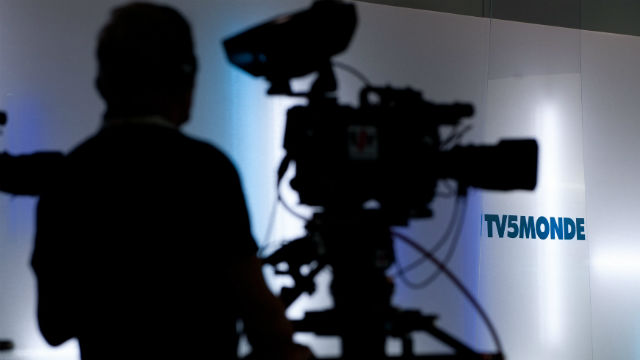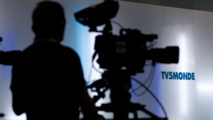Interior Minister Bernard Cazeneuve said: "There are a lot of elements that suggest that a terrorist act" was to blame for the shutdown at the Paris-based station, whose programming is broadcast to an international audience worldwide.
For most of Thursday, the channel was forced to broadcast pre-recorded programmes after what TV5Monde boss Yves Bigot said was a cyber-attack "unprecedented in the history of television."
"When you work in television... and you find out that your 11 channels are down, of course that's one of the most dreadful things that can happen to you," Bigot said.
"Their goal was maybe to broadcast their message on our airwaves and not only social networks and our website," he added subsequently on BFMTV. "They may have wanted... to take our airwaves hostage."
The hackers took control of the station and its social media operations late Wednesday.
By seizing the IT system, they were able to black out the TV channels for several hours.
The self-styled cyberjihadists also posted documents on TV5Monde's Facebook page purporting to be the identity cards and CVs of relatives of French soldiers involved in anti-IS operations, along with threats against the troops.
"Soldiers of France, stay away from the Islamic State! You have the chance to save your families, take advantage of it," read one message on the hacked Facebook.
"The CyberCaliphate continues its cyberjihad against the enemies of Islamic State," the message added.
The defence ministry in Paris said it was working to verify whether the documents were genuine.
- 'Total solidarity' -
"These terrorists hate our freedom and our way of life," European Commission Vice President Frans Timmermans wrote on his Facebook page.
"We have a collective responsibility to defend our freedoms and protect European society against the totalitarianism of terrorism."
French Prime Minister Manuel Valls said the hack was an "unacceptable attack on the freedom of information and expression", voicing "total solidarity with the editorial staff."
Senior government members flocked to the station to show their support, with Cazeneuve saying: "We are up against determined terrorists... we are determined to fight them."
Foreign Minister Laurent Fabius said: "Everything is being done to find those who carried this out, punish them, re-establish the programmes and prevent cyberterrorists threatening freedom of expression in the future."
Culture Minister Fleur Pellerin called a meeting of top French media chiefs to discuss the attack.
After the meeting, she said: "We cannot rule out similar attacks taking place or that they are already being planned."
The hackers had accused French President Francois Hollande of committing "an unforgivable mistake" by getting involved in "a war that serves no purpose".
"That's why the French received the gifts of Charlie Hebdo and Hyper Cacher in January," it said on the broadcaster's Facebook page, referring to attacks by Islamist gunmen in Paris on the satirical magazine and Jewish supermarket that left 17 people dead.
France is part of a US-led military coalition carrying out air strikes against IS in Iraq and Syria, where the jihadist group has seized swathes of territory and declared an Islamic "caliphate".
Close to 1,500 French nationals have left France to join the militants' ranks in Iraq and Syria, where they represent almost half the number of European fighters present, according to a report released Wednesday by the French Senate.
- 'Knights of the media' -
Jihadists have become increasingly adept at using the Internet to spread propaganda and attack media outlets.
In February, the Twitter feed of Newsweek was briefly hacked and threats were made against US President Barack Obama's family.
And in the immediate aftermath of the Charlie Hebdo attacks, hackers claiming to be Islamists hijacked hundreds of French websites, flooding them with jihadist propaganda.
Just hours before the attack, the Islamic State extremist group had published a video praising their "knights of the media" carrying out cyber-attacks and urged them to step up their efforts.
"This is certainly a step up," said Gilbert Ramsay, an expert on cyberjihadism at Saint Andrews University in Scotland.
"For years now, low-level cyber attacks have been a routine part of Islamist mobilisation. They have published manuals on how to hack websites. But this is an escalation," added the expert.
Loic Guezo, a strategic director at Trend Micro, an IT security firm, said that "halting broadcasting for several hours is pretty much a world first."
-------------------------------------------------------------------------------------------------------------------
For most of Thursday, the channel was forced to broadcast pre-recorded programmes after what TV5Monde boss Yves Bigot said was a cyber-attack "unprecedented in the history of television."
"When you work in television... and you find out that your 11 channels are down, of course that's one of the most dreadful things that can happen to you," Bigot said.
"Their goal was maybe to broadcast their message on our airwaves and not only social networks and our website," he added subsequently on BFMTV. "They may have wanted... to take our airwaves hostage."
The hackers took control of the station and its social media operations late Wednesday.
By seizing the IT system, they were able to black out the TV channels for several hours.
The self-styled cyberjihadists also posted documents on TV5Monde's Facebook page purporting to be the identity cards and CVs of relatives of French soldiers involved in anti-IS operations, along with threats against the troops.
"Soldiers of France, stay away from the Islamic State! You have the chance to save your families, take advantage of it," read one message on the hacked Facebook.
"The CyberCaliphate continues its cyberjihad against the enemies of Islamic State," the message added.
The defence ministry in Paris said it was working to verify whether the documents were genuine.
- 'Total solidarity' -
"These terrorists hate our freedom and our way of life," European Commission Vice President Frans Timmermans wrote on his Facebook page.
"We have a collective responsibility to defend our freedoms and protect European society against the totalitarianism of terrorism."
French Prime Minister Manuel Valls said the hack was an "unacceptable attack on the freedom of information and expression", voicing "total solidarity with the editorial staff."
Senior government members flocked to the station to show their support, with Cazeneuve saying: "We are up against determined terrorists... we are determined to fight them."
Foreign Minister Laurent Fabius said: "Everything is being done to find those who carried this out, punish them, re-establish the programmes and prevent cyberterrorists threatening freedom of expression in the future."
Culture Minister Fleur Pellerin called a meeting of top French media chiefs to discuss the attack.
After the meeting, she said: "We cannot rule out similar attacks taking place or that they are already being planned."
The hackers had accused French President Francois Hollande of committing "an unforgivable mistake" by getting involved in "a war that serves no purpose".
"That's why the French received the gifts of Charlie Hebdo and Hyper Cacher in January," it said on the broadcaster's Facebook page, referring to attacks by Islamist gunmen in Paris on the satirical magazine and Jewish supermarket that left 17 people dead.
France is part of a US-led military coalition carrying out air strikes against IS in Iraq and Syria, where the jihadist group has seized swathes of territory and declared an Islamic "caliphate".
Close to 1,500 French nationals have left France to join the militants' ranks in Iraq and Syria, where they represent almost half the number of European fighters present, according to a report released Wednesday by the French Senate.
- 'Knights of the media' -
Jihadists have become increasingly adept at using the Internet to spread propaganda and attack media outlets.
In February, the Twitter feed of Newsweek was briefly hacked and threats were made against US President Barack Obama's family.
And in the immediate aftermath of the Charlie Hebdo attacks, hackers claiming to be Islamists hijacked hundreds of French websites, flooding them with jihadist propaganda.
Just hours before the attack, the Islamic State extremist group had published a video praising their "knights of the media" carrying out cyber-attacks and urged them to step up their efforts.
"This is certainly a step up," said Gilbert Ramsay, an expert on cyberjihadism at Saint Andrews University in Scotland.
"For years now, low-level cyber attacks have been a routine part of Islamist mobilisation. They have published manuals on how to hack websites. But this is an escalation," added the expert.
Loic Guezo, a strategic director at Trend Micro, an IT security firm, said that "halting broadcasting for several hours is pretty much a world first."
-------------------------------------------------------------------------------------------------------------------









 Home
Home Politics
Politics











